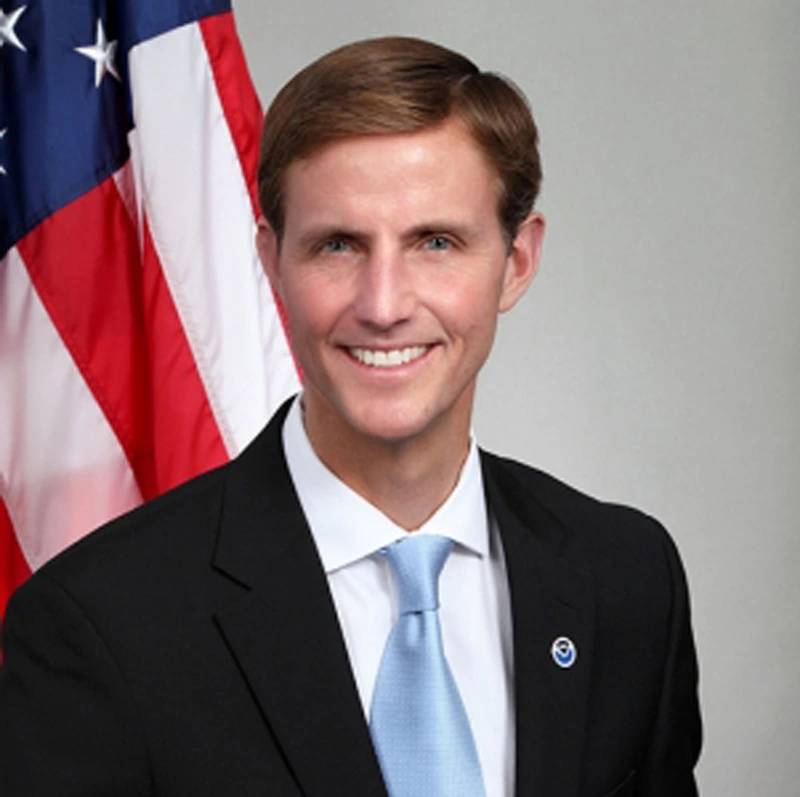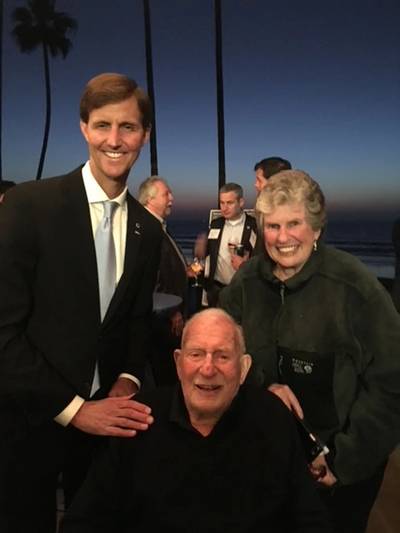Opinion: A Call for the USNS Walter Munk to Honor America’s Greatest Oceanographer
In the 2021 National Defense Authorization Act, Congress established a commission to rename several military bases and ships that commemorate members of the Confederacy. One of these is the Naval oceanographic ship USNS Maury (T-AGS 66), named after oceanographer Matthew Fontaine Maury, who resigned his commission in the U.S. Navy to join the Confederacy at the outbreak of the American Civil War.
The USNS Maury is an asset of the Naval Meteorology and Oceanography Command (NMOC), which I led from 2014-2017. I attended the ship’s commissioning in 2017, where I praised Maury’s recognition as the father of modern oceanography. I did the same on other occasions when I served as the Superintendent of the U.S. Naval Observatory, which Maury founded in 1842. Notwithstanding this association, I agree with others who have called it disgraceful for any military unit to be named after someone who fought against our government to maintain a system that enslaved other human beings.
The most appropriate individual after which to rename USNS Maury would be an American who made significant contributions to Naval oceanography and reflected the diversity of our population. Among the pantheon of our greatest ocean scientists, there is no better candidate than the renowned oceanographer Dr. Walter Munk. I first met Walter when I was a newly-minted Ensign in the Navy while earning a Master’s degree at Scripps Institution of Oceanography, where he was a Professor and research scientist.
This was over 30 years ago, long into his career which spanned nearly eight decades. Since then, I climbed a long ladder in ocean science and technology that carried me to multiple sea-going expeditions, brought me back to Scripps to earn a Ph.D., and led me to serve at the highest levels of the U.S. Government. At every step, Walter Munk served as a beacon, lighting the way and inspiring me along with many others. While volumes could be written about why a ship should bear his name, I share three points here that are both compelling and personal.
- Walter’s first contribution was to national security when he worked with Dr. Harald Sverdrup at Scripps during World War II to predict surf conditions for Allied landings in the Pacific theater. Walter actually enlisted in the Army before Scripps and the Navy found more effective applications for his talent. This began a highly impactful partnership with the Navy that lasted throughout Walter’s life and saw him make critical advances in physical oceanography and underwater acoustics. These directly underpinned the U.S. Navy’s competitive advantage in Antisubmarine Warfare against the Soviet Union during the Cold War. His accomplishments not only inspired me as a junior officer at Scripps, they were foundational for the resurgence of ocean science within the Navy that I led with the establishment of Task Force Ocean. This included advancements in ocean technology and unmanned systems and built upon similar work by the Navy to address climate change impacts on national security.
- More remarkable were Walter’s accomplishments in science as a whole. From unlocking the nature of ocean currents that is the basis of modern numerical models, pioneering research in ocean acoustic tomography and internal waves, developing modern methods of tidal time series analysis, to exploring unexplainable characteristics of sea level rise, the expanse of his impact on the field of geophysics is simply dizzying. When I was given the opportunity to steer National policy regarding ocean science and technology, I did not ignore the example of this iconic ocean champion. As the Acting and Deputy Administrator of the National Oceanic and Atmospheric Administration (NOAA), I initiated and oversaw the development of a National Strategy and Plan to map and explore our oceans, as well as similar efforts to add new and expand existing marine protected areas (MPAs), address marine plastic pollution, combat coral disease, and advance ocean science and technology. Walter’s legacy with Scripps also made notable contributions to the 2019 White House Summit on Ocean Science and Technology Partnerships, which spurred the signing of a trove of agreements between NOAA and partner organizations to move forward in areas such as ocean mapping, exploration, science, public understanding, countering illegal fishing, conserving coral reefs, and expanding the research and operational application of autonomous systems and artificial intelligence.
- A third aspect of Walter’s mark on America is the strength in diversity that he represented. Walter came to the United States from Austria-Hungary in 1937, and in response to Nazi Germany’s annexation of Austria in 1938, he applied for and obtained U.S. citizenship in 1939. While discussions on diversity nowadays tend to focus on race, it is equally important to include our immigrant population. According to the U.S. Census Bureau, foreign-born citizens are the second largest minority group in America, tied with African Americans. As a non-native English speaker who rose to the equivalent of royalty in U.S. science, Walter embodied the American dream. I never lost sight of this while I served in the Navy and at NOAA, deliberately including our immigrant teammates in my outreach and recognition during diversity events with employees, partners, and lawmakers.
Several months after Walter passed away in February of 2019, his family asked me to be the Master of Ceremonies at a recognition event for him planned for October of that Year. This widely attended event was preceded by the Walter Munk Legacy Celebration hosted by Scripps the day before, and it was followed by a ceremony and paddle-out near the Scripps research pier the day after. Across the three days, the total measure of the man was summed by the extraordinary expanse, magnitude, and diversity of those who gave tribute to him. While the naming commission struggles to secure broad public support for their Congressional mandate, they can do no better in renaming the Navy’s newest oceanographic ship after the loyal veteran, esteemed scientist, and naturalized citizen - Walter Munk.
 The Author: Rear Admiral Tim Gallaudet, Ph.D., U.S. Navy (retired). Rear Admiral (ret) Gallaudet is the CEO of Ocean STL Consulting and host of The American Blue Economy Podcast. From 2017-2021 he was the Acting and Deputy Administrator of the National Oceanic and Atmospheric Administration (NOAA) and Assistant Secretary of Commerce for Oceans and Atmosphere. Prior to NOAA he served for 32 years in the U.S. Navy retiring as the Oceanographer of the Navy.
The Author: Rear Admiral Tim Gallaudet, Ph.D., U.S. Navy (retired). Rear Admiral (ret) Gallaudet is the CEO of Ocean STL Consulting and host of The American Blue Economy Podcast. From 2017-2021 he was the Acting and Deputy Administrator of the National Oceanic and Atmospheric Administration (NOAA) and Assistant Secretary of Commerce for Oceans and Atmosphere. Prior to NOAA he served for 32 years in the U.S. Navy retiring as the Oceanographer of the Navy.














